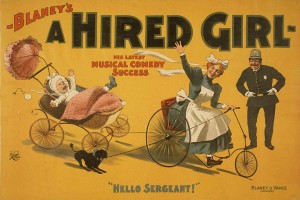by Laurel | January 21st, 2014
21 January 1900
One of Her Views of Society
And a Few of Her Eccentricities Displayed by Individuals
How true is that good old saying: —
“The hand that moves the ladle
Is the hand that rules the world.”
Never has the hired girl problem confronted the American housewife in such shape as it does today. And yet the say that this is a free country. What woman is free who employs one handmaiden in her home, and what woman is not a slave who has more than one of that ilk? There are even some who are envious of those who have four or five girls. Verily they are not when they are well off. There are various methods used in hunting the girl and the most popular of them all is to track her to her lair in the employment agency. If there is one thing that will make a man cross a street and sneak on the other side, it is “Employment Bureau, Room 2.” They have no use for men. They are a luxury only intended for women in search of adventure. The average “agency” is run by a man, but he is only a figure-head and a name upon the door. It is a woman who has employ, a female without nerves, she does the actual work.
When you enter the front room of an agency you see a collection of humanity without name-tags, strewn about the sides of the room. They may not look interested when you enter, but they are. They size you up out of the corner of one eye and begin to speculate as to whether or not they would like to have you live with them. And these are the future servants. They soon become expert judges of human nature, and know you will be easy to bulldoze if you have a spot on your gown or hat on crooked. Never enter an agency unless you have made a careful toilet. The average “sitter” in an agency pursues a course of reasoning somewhat as follows: “She’s five feet three inches. Bad sign. Probably rules the house, and husband lives at the club most of the time. Likes an early breakfast. Husband always cross and because of the club, no appetite. wants dinner at noon. Got gray eyes and dress doesn’t fit well. Know she is cross; don’t want to go there.”
So when the agent asks her if she thinks the work will suit her, she allows she doesn’t want to live at Forest Park and won’t go. Pretty soon a young woman comes in who is pretty, very pretty. Her gown is new and her hat is new. She has tears in her eyes and tells the agent that Maggie was rude and she sent her away. The sitter gives a little cough and smiles sympathetically. She knows a bride when she sees one, and she jumps at the chance. Well she knows that the family will be too busily engaged luling and cooing to pay any attention to their food and nights out will come eight days n the week. She could live in Chicopee with such a woman for a mistress, and the “sitter” goes and another takes her place.
But a man in an agency. Oh the gods. he comes in with an expression half of fright and half of bravado and engages the first girl who is sent to him and asks no questions. All he wants is something that won’t break the dishes and that will build the fire in the morning, and he gets the scum of the shop in consequence. Don’t send your husband t engage a girl for you. He doesn’t care if she can’t make bread, just as long as she can cook wood-duck and if she can pull a cork she can snare double wages.
These girls of ours are as close social students as we have among us. They are walking directories of th people, whom the poor girl foes not want to meet, and the names of some of our best people, don’t you know, are need as by-guards in every kitchen in the town. If you don’t believe it, as your girl. There is no doubt several chunks of truth on disposition and past history of many of social leaders brought out in these little impromptu women’s clubs in the rear of houses, which might be intensely interesting if known in the front part of our dwellings. The text-books of these clubs are found in the want “ads” in the daily newspapers. there are houses in this city where civil war goes on with the pleasing frequency of a South American republic. Special notice is given of the fight in the advertisement columns, and a thousand hearts in our kitchens beat high in sympathy with another struggle for liberty and the downtrodden.
Why the moon is not made of green cheese, and why a maid servant will not lice in the country are two questions yet resolved. A good girl will live in the aristocratic part of the city if you will give her the use of the piano and let her have a dinner party one a week, but go into the country, not on the memory of the Emerald Isle. Occasionally you can find a big girl from Vermont who has the good blue blood of the American patriots in her veins and so prefers a rural town to the city. This gives her time ans solitude to read her work on “Dreams” in peace. She will work but she will make mistakes. If you happen to have a particularly swell New Yorker staying with you she will invariably serve pie for breakfast and then weep when you tell her things afterward. This class of handmaidens is easily recognized because of their style of dress. A Swede will wear red and white, and an Irish girl will wear green, but the true daughter of the American soil will never be happy unless she has all the shades in the rainbow mixed up in her attire. Once upon a time there was such a girl, and her heart longed for society. She had read books in which Marguerite the shop lady, married the earl of somethingoranother, and she longed for a million dollars and a place at New York. And so it happened that callers came to the house wherein she earned her daily bread, and she saw them sitting in the area waiting for the hostess to come down from regions above, and her heart leapt with pure joy. She would try her hand as an entertainer. There were visitors and stranger in the house, and the unexpecting men would think her one of them. She sailed out onto the veranda and sand into a chair with a crash. She was not graceful. Then she started a Ladies’ Home Journal conversation that was most edifying. The men though something was wrong, but were too lazy to see what it was, and then the mistress of the house came down. When last heard of, the would-be countess was frying eggs for a night lunch.
The Swede makes the best servant. They are honest and diligent and of good families. When a family loses their money in Sweden and the children are thrown on the world to earn their own they are apt to come to America. To proud to work at home, they wish to hide themselves in the oblivion of the states until a time comes when they have saved enough to go home and live in comfort, if not in luxury. Germans become servants once in a while, but not often in this part of the country, but in the middle West they take much the place that the Irish do here. French servants fo not come to private families in America to any extent. you see them on the stage and you read of them in books, but you love hubby too dearly to employ one about the house. Of course there is Alphonse in the restaurant, but he does not count as a servant. He is a king. English servants are treasures when they can be found, and especially when they have been trained in the old country, but most of them stay in New York, where wages are higher. New England is marked about the rest of the earth for the buxom, dashing American who leaves a trail of broken dishes in her wake.
What will be the solution of the great problem? Will the Chinese invade the East the way they have the West and become servants? Would that they would. They are ideal. Asking not for high wages, only to be let alone and given a certain sum of money to run the house with and absolute freedom. If you have a Chinaman for a cook, don’t ask him any questions; it will take away both romance and appetite if he answers you. But they are good cooks and better buyers. Perhaps we may all have little Filipino boys for servants some of these days, if they don’t kill them all. Who knows what the future servant will be. Probably there won’t be any. Everything will be done by electricity and an automobile maid will bring in your cup of coffee in the morning who has been sent up from a restaurant down town over some new model telephone or coffee-phone. The world is progressing in everything but servant girls, and they are not even standing still, they are going backward. It’s a weary world, and it seems wearier when has to think of a solution to this question.
Adapted from The Springfield Republican.









